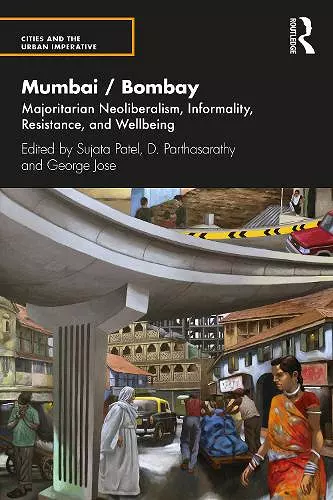Mumbai / Bombay
Majoritarian Neoliberalism, Informality, Resistance, and Wellbeing
Sujata Patel editor D Parthasarathy editor George Jose editor
Format:Paperback
Publisher:Taylor & Francis Ltd
Published:17th Jun '22
Currently unavailable, and unfortunately no date known when it will be back
This paperback is available in another edition too:
- Hardback£145.00(9781032276694)

Mumbai / Bombay is a quintessential urban expression which represents the questions and puzzles related to Indian urbanity. This book traces the various ways through which majoritarianism and neoliberal capitalist accumulation has reorganised Bombay or Mumbai in India.
The book assesses Mumbai’s present trajectories and processes as being embedded in its recent past. It looks at these changes by exploring work and labour; health and education; spatial planning and infrastructural development; politics and identity; and shows how financialisation, land speculation, deregulation, and informality have impacted the city’s culture and everyday living. The contributors to this volume analyse the consequences of these changes for women and men across ages, as they live their material and cultural lives; evaluate the role of the changing nature of work, urban infrastructure, and planning; determine its outcome for public health and education; and take a measure of its manifestation in the field of arts and culture. The volume explores the processes that reorient these changes, the socio-spatial and political implications of these on the inhabitants of the city, and the resistance and response to marginalisation.
This interdisciplinary volume will interest students and researchers of economics, sociology, anthropology, political science, public policy, development studies, and urban studies. It will also be useful to urban practitioners, planners, bureaucrats, activists, and general readers.
‘This indefatigable team of urban social interpreters have peeled open Mumbai. This book surveys the impact on the highly unequal, seething, cosmopolitan, global city not only of neo-liberal capitalism and illiberal Hindu majoritarianism but also of a moment of pandemic disease. Its three parts contain recent histories of the destructive impacts of the deregulation and informalisation of male and female labour processes, the public-privatisation and ecological damage of infrastructure and social provisioning on the wellbeing of the poor masses of its population – rather than the middle-class elite which hogs the literature. We are invited to explore cases of territory, land, disrupted homes and livelihoods, of networks and transport, of the interests at play in failed planning, of business made precarious by neoliberal markets ranging from meat to art, of health, education and the control of services by right-wing organisations, of fissiparous resistance by victims of these forces and their turf wars. Look no further than this thoughtful, innovative and exciting collection for Mumbai of the now and the immediate future.’
Barbara Harriss-White, FAcSS, Emeritus Professor of Development Studies and Fellow, Wolfson College, Oxford University, UK
‘For anyone with an interest in the soul of the “Urbs Prima” of India, the wait is finally over! This new collection narrates the city by looking at health, labour, housing and culture. A diversity of contributions highlight how norms of civility and solidarity are severely tested when labour, housing and basic amenities remain elusive for a vast majority. Conversely, a culture of consumption and a new platform economy take hold. As shown with sharp precision here, this increased precariousness result from the intertwined logics of neoliberalism and Hindu majoritarianism. The seeds of (and for) resistance are present, however, and this book is one of them.’
Marie-Helene Zerah, Research Director, IRD (French National Institute of Research for Development), France
‘This volume offers a comprehensive overview of the impact of neoliberalism and Hindutva on a mega city which, in the process has even changed its name! Each chapter, based on in depth ethnographic research, presents one dimension of this transformation which is multifaceted: socio-economic, cultural, societal and, of course, political. A true analytical atlas of the city from below, where informalisation of work and the dismantling of welfare go together with the rise of elite-driven Hindu majoritarianism.’
Christophe Jaffrelot, Research Director, CERI-Sciences Po/CNRS and Professor of Indian Politics and Sociology, King´s College London, UK
‘Mumbai / Bombay: Majoritarian Neoliberalism, Informality, Resistance, and Wellbeing breaks new theoretical and empirical ground in making sense of one of the world’s most complex urban conglomerations. From the turbulences of its economic transformations, the explosion of its land markets, the competing jurisdictions of its governance structures, the divisiveness of its politics and chaotic growth of its slums, Mumbai defies explanation. Yet through their innovative analytic frame of “majoritarian neoliberalism” – clearly developed in the introductory chapter – the authors provide a powerful lens through which to understand how politics, governance, shifting social structures and economic development have historically intersected in shaping the city. This theoretical frame in turn provides the scaffolding for a diverse set of empirically grounded case studies that explore themes ranging from the specialisation of gendered work, the politics of infrastructure development, the structuring of basic services and the governance of the informal. As global cities confront the challenges of increasingly precarious and informalised modes of work and livelihood and India’s democratic traditions contend with new threats of illiberalism, this unique and audacious volume of interdisciplinary explorations of how this all plays out in the urban trenches of Mumbai is more urgent and important than ever.’
Patrick Heller, Lyn Crost Professor of Social Sciences and Professor of Sociology and International and Public Affairs, Brown University, USA
ISBN: 9781032276724
Dimensions: unknown
Weight: 399g
258 pages